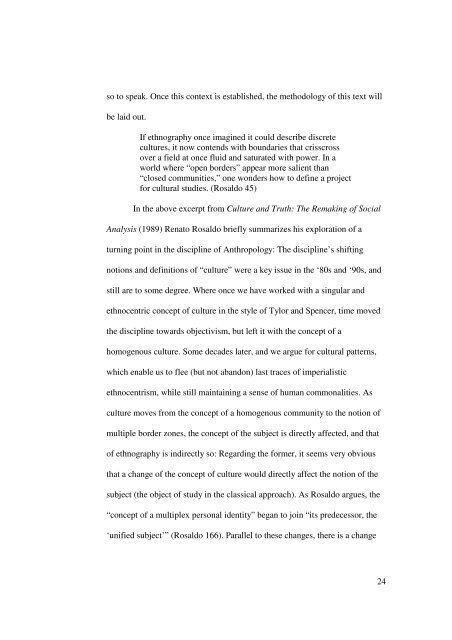Girls who like Boys who like Boys – Ethnography of ... - Yuuyami.com
Girls who like Boys who like Boys – Ethnography of ... - Yuuyami.com
Girls who like Boys who like Boys – Ethnography of ... - Yuuyami.com
You also want an ePaper? Increase the reach of your titles
YUMPU automatically turns print PDFs into web optimized ePapers that Google loves.
so to speak. Once this context is established, the methodology <strong>of</strong> this text will<br />
be laid out.<br />
If ethnography once imagined it could describe discrete<br />
cultures, it now contends with boundaries that crisscross<br />
over a field at once fluid and saturated with power. In a<br />
world where “open borders” appear more salient than<br />
“closed <strong>com</strong>munities,” one wonders how to define a project<br />
for cultural studies. (Rosaldo 45)<br />
In the above excerpt from Culture and Truth: The Remaking <strong>of</strong> Social<br />
Analysis (1989) Renato Rosaldo briefly summarizes his exploration <strong>of</strong> a<br />
turning point in the discipline <strong>of</strong> Anthropology: The discipline’s shifting<br />
notions and definitions <strong>of</strong> “culture” were a key issue in the ‘80s and ‘90s, and<br />
still are to some degree. Where once we have worked with a singular and<br />
ethnocentric concept <strong>of</strong> culture in the style <strong>of</strong> Tylor and Spencer, time moved<br />
the discipline towards objectivism, but left it with the concept <strong>of</strong> a<br />
homogenous culture. Some decades later, and we argue for cultural patterns,<br />
which enable us to flee (but not abandon) last traces <strong>of</strong> imperialistic<br />
ethnocentrism, while still maintaining a sense <strong>of</strong> human <strong>com</strong>monalities. As<br />
culture moves from the concept <strong>of</strong> a homogenous <strong>com</strong>munity to the notion <strong>of</strong><br />
multiple border zones, the concept <strong>of</strong> the subject is directly affected, and that<br />
<strong>of</strong> ethnography is indirectly so: Regarding the former, it seems very obvious<br />
that a change <strong>of</strong> the concept <strong>of</strong> culture would directly affect the notion <strong>of</strong> the<br />
subject (the object <strong>of</strong> study in the classical approach). As Rosaldo argues, the<br />
“concept <strong>of</strong> a multiplex personal identity” began to join “its predecessor, the<br />
‘unified subject’” (Rosaldo 166). Parallel to these changes, there is a change<br />
24


